ARISTOTLES Politics
Second Edition
TRANSLATED AND WITH AN INTRODUCTION, NOTES, AND GLOSSARY BY CARNES LORD
The University of Chicago Press
CHICAGO AND LONDON
CARNES LORD is professor of military and naval strategy at the Naval War College. He is the author or editor of several books, including The Modern Prince: What Leaders Need to Know Now.
The University of Chicago Press, Chicago 60637
The University of Chicago Press, Ltd., London
1984, 2013 by The University of Chicago
All rights reserved. Published 2013.
Printed in the United States of America
22 21 20 19 18 17 16 15 14 13 1 2 3 4 5
ISBN-13: 978-0-226-92183-9 (cloth)
ISBN-13: 978-0-226-92184-6 (paper)
ISBN-13: 978-0-226-92185-3 (e-book)
ISBN-10: 0-226-92183-2 (cloth)
ISBN-10: 0-226-92184-0 (paper)
ISBN-10: 0-226-92185-9 (e-book)
Library of Congress Cataloging-in-Publication Data
Aristotle.
[Politics. English. 2013]
Aristotles Politics / translated and with an introduction, notes, and glossary by Carnes Lord. Second edition.
pages ; cm
Includes bibliographical references and index.
ISBN-13: 978-0-226-92183-9 (hardcover : alkaline paper)
ISBN-13: 978-0-226-92184-6 (paperback : alkaline paper)
ISBN-13: 978-0-226-92185-3 (e-book)
ISBN-10: 0-226-92183-2 (hardcover : alkaline paper)
1. Political scienceEarly works to 1800. I. Lord, Carnes, translator, writer of added commentary. II. Title. III. Title: Politics.
JC71.A45L67 2013
320.1dc23
2012030592
 This paper meets the requirements of ANSI / NISO Z39.48-1992 (Permanence of Paper).
This paper meets the requirements of ANSI / NISO Z39.48-1992 (Permanence of Paper).
CONTENTS
Politics
INTRODUCTION
To say that Aristotles Politics is a classic work of political thought is to understate considerably the achievement and significance of this remarkable document. The Politics is a product of that singular moment in the history of the West when traditional modes of thinking in every area were being uprooted by the new mode of thinking that had made its appearance in the Greek world under the name of philosophy. It was in and through the elaboration of a philosophic-scientific approach to natural and human phenomena by the ancient Greeksabove all, by Plato and Aristotlethat the intellectual categories of the Western tradition took shape. The significance of Aristotles Politics lies in the first instance in the fact that it represents the earliest attempt to elaborate a systematic science of politics.
The subject matter of the Politics is politics in its original sensethe affairs of the polis, the classical city-state. The word polis cannot be translated by the English state or its modern equivalents because polis is a term of distinction. It denotes a political form that is equally distant from the primitive tribe and from the civilized monarchic state of the ancient East. The polis, the form of political organization prevailing in the Greek world during its greatest period (roughly the eighth to the third century BC), was an independent state organized around an urban center and governed typically by formal laws and republican political institutions.
Politics in its original sense is at once narrower and broader than politics in the contemporary sense. It is narrower in virtue of its association with an essentially republican political order, but broader by the fact that it encompasses aspects of life which are today regarded as both beyond and beneath politics. The Politics trespasses on ground that would today be claimed by the disciplines of economics, sociology, and urban planning, as well as by moral philosophy and the theory of education.
Yet the scope and range of the Politics represents more than a passive reflection of its historical moment. By exhibiting the complex unity of the elements of human life and the manner of their fulfillment in the polis and the way of life it makes possible, Aristotle provides at once an articulation of the phenomenon of politics in the fullness of its potential and a powerful defense of the dignity of politics and the political life. For this reason above all, the Politics is an original and fundamental bookone of those rare books that first defines a permanent human possibility and thereby irrevocably alters the way men understand themselves.
This much may be said at the outset regarding the general character and significance of the work before us. Before entering on a fuller consideration of the Politics, it is essential to present some account of Aristotle himself and the age in which he lived and wrote.
I
Aristotles life is frequently presented as one of virtually uninterrupted devotion to study, with little connection to the great events of the age. To the extent that his well-attested relationship with the rulers of Macedon is acknowledged, it tends to be viewed as a sort of historical curiosity with few implications for Aristotles own activity. Yet a good case can be made for quite a different interpretation. Although the evidence bearing on Aristotles life is very incomplete and often conflicting and unreliable, it seems highly likely that he was more active politically on behalf of Macedon, and that his fortunes were more intimately bound up with those of its rulers, than is commonly supposed. At the same time, it appears that the traditional picture of Aristotle as a close associate and admirer of Alexander and his works is, at best, very overdrawn.
Aristotle was born in 384 BC in the town of Stagira, in the Chalcidic peninsula of northern Greece. His father, Nicomachus, was court physician to Amyntas III of Macedon, and is said to have become the kings close friend and advisor; hence it would appear that Aristotle was brought up primarily in Macedonia itself. At the age of seventeen, Aristotle was sent to Athens to pursue his education. Most reports indicate that he immediately joined the Platonic Academy, though some evidence suggests that he may have enrolled initially in the rhetorical school of Isocrates, which was then better known throughout the Greek world. He remained in Athens, in close association with Plato, for the next twenty years.
The circumstances of Aristotles departure for Athens are of some interest. Amyntas III had died in 370/69. His eldest son and successor, Alexander, was murdered shortly thereafter by Amyntass brother-in-law, Ptolemy of Alorus, thus initiating a dynastic struggle that was only resolved with the accession of Amyntass younger son, Philip, in 359. It may well be that the dispatch of Aristotle to Athens in 367 had as much to do with the political turbulence at home as with the intrinsic attractions of that great center of culture and learning.
Similar considerations are likely to have played a role in Aristotles departure from Athens in 348/47. It is usually assumed that Aristotle left the Academy after the death of Plato because of disappointment at the choice of Platos nephew Speusippus as the new head of that institution rather than himself, and possibly because of sharpening philosophical disagreements with the followers of Plato generally. Another explanation is, however, at least equally plausible. Ten years of Philips rule had brought internal stability to Macedon, and the beginnings of the aggrandizement of Macedonian power and influence that was shortly to make it the most formidable state in the Greek world. Athens, its traditional interests in the north of Greece menaced by these developments, found itself increasingly at odds with Philip. In the summer of 348, with the capture and sack of Olynthus, the capital of the Chalcidic Federation, Philip succeeded in bringing all of the neighboring Greek cities under his control, in spite of a belated Athenian intervention stimulated by the fiercely anti-Macedonian oratory of Demosthenes. Given the atmosphere then prevailing in Athens, it would not be surprising if Aristotle had chosen to remove himself from the city. In fact, there is some evidence that Aristotle actually left Athens before the death of Plato; and one account explicitly states that the reason for his departure was that he was frightened by the execution of Socratesthat is, by the prospect of a revival of the politically motivated popular hostility to philosophy that had led to the trial and death of Platos famous teacher at the hands of the Athenians a half century earlier.
Next page
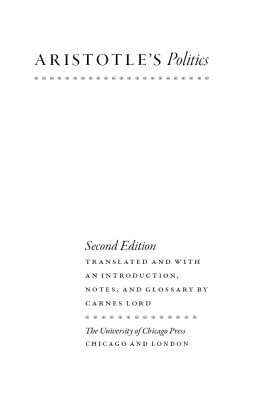




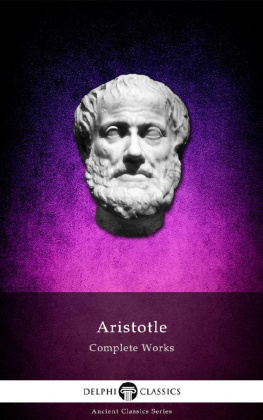

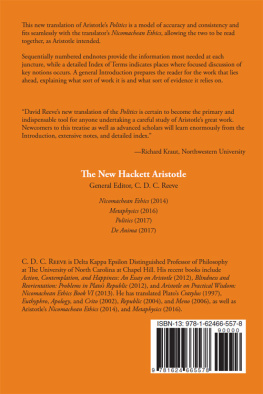
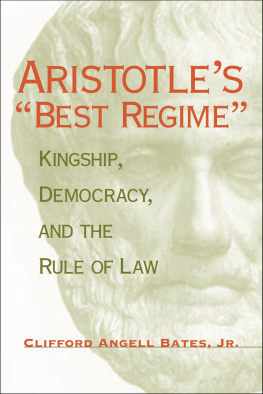
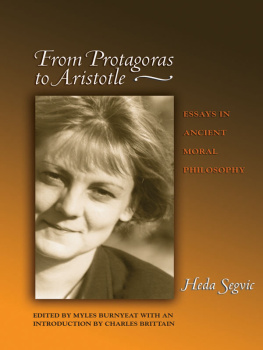
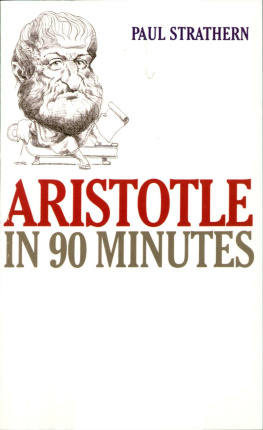
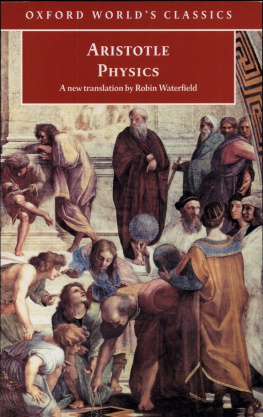
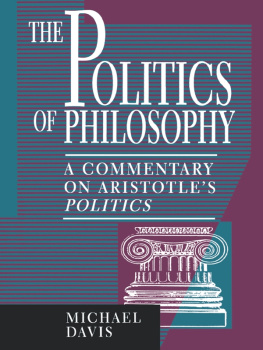
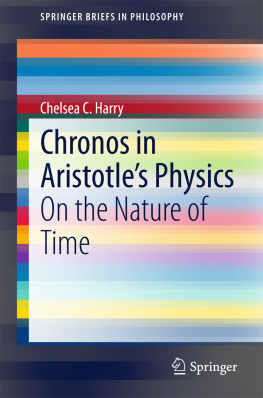
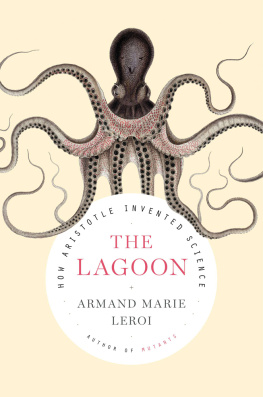
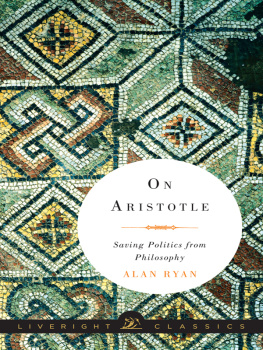
 This paper meets the requirements of ANSI / NISO Z39.48-1992 (Permanence of Paper).
This paper meets the requirements of ANSI / NISO Z39.48-1992 (Permanence of Paper).